2006 February
About Andrew Cusack
 Writer, web designer, etc.; born in New York; educated in Argentina, Scotland, and South Africa; now based in London.
Writer, web designer, etc.; born in New York; educated in Argentina, Scotland, and South Africa; now based in London. read more
News
Blogs
Reviews & Periodicals
Arts & Design
World
France
Mitteleuropa
Knickerbockers
Argentina
The Levant
Africa
Cape of Good Hope
Netherlands
Scandinavia
Québec
India
Muscovy
Germany
Academica
The Governor’s Suite, City Hall
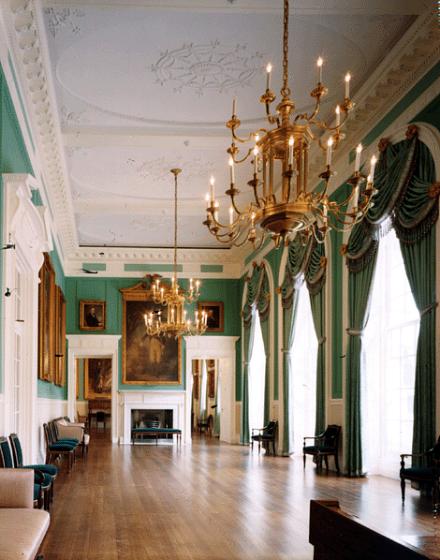
I HAVE NEVER been inside New York’s City Hall, though I have walked or driven past it on a number of occasions. With tall skyscrapers of various ilks towering over it, it always seemed rather small and inconsequential, and I knew nothing of the interiors save the Blue Room in which the Mayor usually gives press conferences and the rotunda which is fairly well-known as well.
I was delighted, therefore, to stumble upon the above photo of the recently-restored Governor’s Suite in City Hall, which shows it to have a rather handsome interior. Since the state government embarked upon an up-river journey to Albany, I presume the purpose of the Governor’s Suite is to provide a place for New York’s head of state to receive and entertain important dignitaries visiting the Big Apple. The current green color of the walls seems much preferable to the previous and rather dull white. I must endeavour to visit City Hall when I next return to the metropolis. (more…)
The Eastchester Covenant
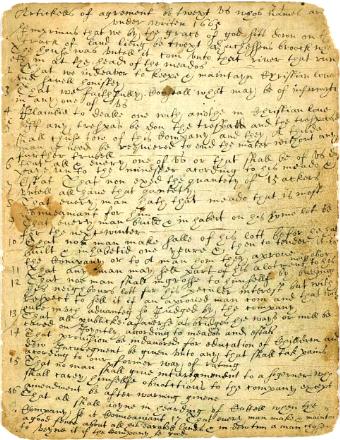
The Town of Eastchester, New York was settled in 1664 and in the following year the English inhabitants thereof drew up a covenant binding all the townsfolk. Among the various articles within this foundational tract are sensible pronouncements guaranteeing the rights of private property, forbidding trespassing, and a promise to “indeavor to keepe & maintayn Christian love and sivell honesty”.
My favorite part, however, is article 15, stating that “no man shall entertain obnoxious foreigners”.
The Knights of Malta Ball 2006

BACK DOWN TO the Assembly Rooms of Edinburgh for the annual ritual of the Knights of Malta Ball and I am happy to report that, as per usual, a good time was had by all. We had a larger contingent heading down from the Auld Grey Toon than last year (when it was just Fräulein Hesser and myself), consisting of Abigail, Jon Burke, Stefano, Clare Dempsey, and yours truly. After gliding down from Fife via taxicab, we met up with Zygmunt Sikorski-Mazur, Jamie Bogle (sans Joanna, alas), and Gerald Warner at the Opal Lounge, a little past half six, and managed to pack in at least a round of drinks before heading across George Street to the Assembly Rooms (depicted in the engraving below).

Having dropped off our coats and such, we swept up the staircase to the Ballroom for some champagne before dinner. After mulling about and conversing for a while we bumped into the Cardinal Archbishop of St Andrews himself, H.E. Keith Patrick O’Brien, himself a Grand Cross Conventual Chaplain to the Order of Malta. We apologised for not maintaining his senior cathedral in St Andrews in the same state as his junior one in Edinburgh, but I did thank him profusely for allowing us an indult mass at Ravelston. (more…)
More Wilsonian Piffle Brought to Light
A very interesting article entitled ‘Two of the Famous Stories About Woodrow Wilson — And They’re Not True‘ by Thomas Fleming. An excerpt:
The chairman of the committee, Senator Thomas S. Martin of Virginia, was also the Senate Democratic majority leader. Martin scowled at Pierce and asked him to explain how the army was going to spend this stupendous sum, the equivalent of perhaps $50 billion in today’s dollars.
Pierce began listing how much it cost to build training camps, buy rifles, artillery, airplanes — then added nervously: “And we may have to have an army in France.”
“Good Lord!” Senator Martin said. “You’re not going to send soldiers over there, are you?”
Few comments better exemplify the almost incredible naivete that underlay the American decision to declare war on Germany.
Henry Lorimer & William F. Buckley
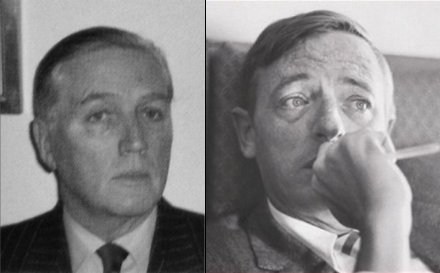
The latest lookalikes: Henry Lorimer, Convenor of the Companions of the Order of Malta in Scotland, and William F. Buckley, Jr., of some reknown.
The Two Germanies
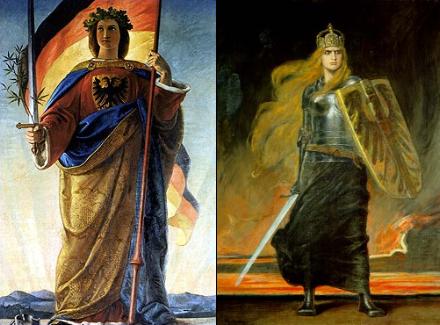
A recent post by Aelianus entitled The Two Germanies brought to mind a little-known idea which surfaced towards the end of World War II. I read in the biography of Empress Zita that a plan was hatched to divide what we now know as Germany, combining Bavaria and Austria to create a Catholic state under the restored Hapsburgs and leaving northern Germany to be a Protestant kingdom with, odd as it might perhaps seem, Lord Louis Mountbatten. Of course it’s not really that odd when one considers that the real name of the Mountbatten family is Battenberg, changed to disguise their Teutonicity during the Great War when the fervor of hatred against our cousin the Hun ran willy-nilly. While Mountbatten was born in Windosr Castle and served as First Sea Lord as well as the final Viceroy of India, he was really entirely German in terms of ancestry. His parents were Prince Louis of Battenberg and Princess Victoria of Hesse and the Rhine, while Louis IV, Grand Duke of Hesse and the Rhine was his grandfather. By right, he was His Serene Highness Prince Louis of Battenberg, but cherishing their adopted country, the family were intimidated into dropping all German styles and titles in 1917.
Lord Mountbatten apparently took the proposal seriously enough that he began to brush up on his German, and informed Empress Zita, living in exile in the Dominion of Canada during the Second World War, of its prospects for both their families. Of course, with Yalta, nothing was ever to come of it and the closest Lord Mountbatten ever came to power, aside from his reign as Viceroy of India, was in 1967 when he was alledgedly asked to lead a coup overthrowing the Labour government. Mountbatten was highly reluctant, and nothing came of the plot. In 1979, while summering at his usual holiday home in the Irish Republic, Mountbatten was killed by an IRA bomb, along with the Dowager Lady Brabourne (aged 82), the Hon. Nicholas Knatchbull (aged 14), and Paul Maxwell (aged 15), a local boy working on the Mountbatten’s boat. He was a Knight of the Garter, a Knight Grand Cross of Bath, Order of Merit, Knight Grand Cross of the Star of India, Knight Grand Cross of the Indian Empire, Knight Grand Cross of the Royal Victorian Order, and the Distinguished Service Order.
Monster Swallows Village Whole
‘But will it give birth?’ the Villagers Inquire
“NYU is the largest private university in the United States and they are growing,” Andrew Berman, executive director of the Greenwich Village Society for Historic Preservation, told Community Board 2 Thursday night. “They are growing at a much faster pace than our neighborhood is. NYU has always been here. It should always be here. I don’t think the Village would be the Village if NYU wasn’t here. But I don’t think the Village can stay the Village if it is predominantly NYU.” And so a new campaign to get NYU to check it’s own expansions in the Village by creating a “secondary campus” begins. [Gothamist]
A secondary campus such as, for example, the one they sold off in 1979? I would have to concur that NYU has grown rather too large for the Village’s britches, and the fact that NYU is trying to build a towering dormitory where St. Ann’s once stood doth not encourage feelings of merriment (though, of course, the blame for that belongs mostly to our archbishop from the Middle West). At any rate, perhaps NYU can strike a deal and buy back the University Heights campus. Unlikely, since the City University of New York which now owns the campus (run as Bronx Community College) would probably like to see itself as a competitor to NYU (it isn’t; they’re leagues apart).
Of course one idea is to stop expanding and maintain the current size and facilities of the university, but this is unlikely. NYU have displayed a Hitlerian glee in the acquisition of neighboring properties, and, to stretch the analogy beyond any rational use, Fordham, St. John’s, and Columbia have no strategic interest in acting as the UK, US, and Soviet Union (respectively) in uniting to counter that expansion.
Previously: Thoughts on NYU et cetera | Back in the Day | New Washington Square Plans | NYU – Old & New
The Wedding
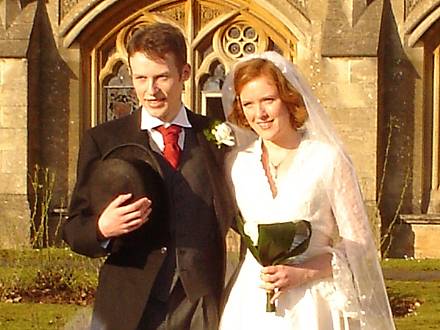
What a marvelous affair it was! And damn jolly to boot. We all had quite the ball and enjoyed ourselves immensely. But where to start? Right, the beginning…
Improvements
REACTIONARIES HAVE FOOLED themselves into believing the world has been getting worse and worse, essentially since the Fall. Progressives meanwhile, heartened by fairly recent progress-heralding genocidal masterpieces such as the French, Russian, and Chinese revolutions, believe the world is getting better and better with the March of Time. But we, the happy middle, – conservatives and traditionalists – know that Man is as Man was and as Man will be, and that we will see days of sadness and terror just as we will see days of greatness and glory. It was found to be greatly encouraging, therefore, when I chanced upon the Mess of the Officer Training Corps here in St Andrews last night and was greeted not by the bilious throbbing beats of noxious rap music, but instead by the dulcet syncopations of Tchaikovsky’s Swan Lake. Under the attentive ear of J.E.B., new President of the Mess Committee, A Squadron, TUOTC, I am happy to report that bad music has been given the old heave-ho.
YET, AS THE commendable is oft accompanied by the regretable, the hallowed pasttime of smoking has tragically been banned in the Mess. This is doubly wounding as the ban has taken place before the Scottish ban on smoking in public places takes effect (March 27), but also because the Mess is Ministry of Defence property and thus effectively exempt from the ban. Alas, the spirit of bureaucracy and nanny-ism has partly infected (some would say taken over) the caverns of the M.o.D. and decrees were handed down from above that smoking would be banned from January 1, 2006. Shameful, as it was one of the best places to enjoy a toke on the old pipe, especially since a pipe rack (donated by J.E.B. himself) was dutifully placed on the mantle below the portrait of Her Majesty. Nonetheless, we look forward to continued improvements under the tenure of Mr. J.E.B., and wish him well.
A Journey to Mells
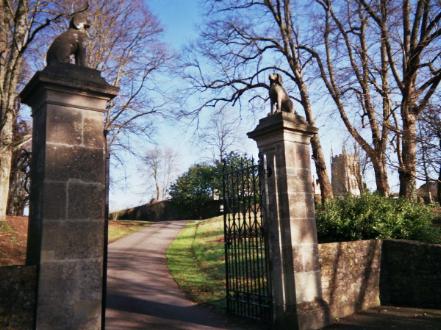
A good number of we happy St Andreans were down in the West Country recently — Somerset to be precise — for the wedding of two of our dear and closest friends [to be covered in a later post]. Being in Somerset, Alec, “Ishmael”, Clare and my good self decided to hop over to the little village of Mells last Friday to see the grave of Msgr. Ronald Knox and to sup at what is known as one of the best pubs in all of England. (more…)
Return and Remembrance
Well, yours truly has dutifully returned to hallowed Andreanopolis in pursuit of his last Candlemas term ever, to be capped off (Deo gratia) by the awarding of Master of the Arts degree this June. George Ronald Valentine Hastings Irwin picked me up from the airport on Friday morning and expressed his shock that he was graduating on time in the alloted four years and his even greater shock that I too am on course to complete the very same task.
As we drove down the Guardbridge Road towards our ancient seat of learning, the turrets, towers, and spires of the Royal Burgh were completely shrouded in haugh, that peculiar Scottish form of fog that rolls off the North Sea. Returning to dear old Sallies I came upon Dawn and Lisa, the two cleaners responsible for our corridor, chatting in the hallways (as is their wont), welcoming my return while lamenting my longer-than-ordinary absence. Most of the day was spent unpacking my various posessions. Because St. Salvator’s Hall was used to host a conference over the break, all the inhabitants thereof had been forced to pack away their belongings in storage. Thus after picking up my key from the porter and turning the lock on my room, I was greeted not by the welcome signs of my inhabitation but instead by a room bare but for the rearranged furniture, a different lamp (which doesn’t work, unlike the previous one), and the usual New International Version of the Holy Bible in the desk drawer.
Much to my lamentation, I quickly discovered that the great majority of my cohortem had skipped off to Pluscarden Abbey for a few days. Nonetheless, the trusty Alexander O’Hara was amongst the remaining and we met for a pint at the Whey Pat, just outside the town’s remaining city gate, before repairing to the Cellar Bar for a better brew. The following morning I met up with Ishmael for breakfast at the Victoria Café. [TEXT REDACTED]
After breakfast, I fell asleep in the library reading La Vita Nuova (apologies to Mr. Aligheri, but I did finish it when I awoke). After a woefully disappointing luncheon in hall, followed by ever-so-slighly less disappointing but more filling microwave meal to fill my empty belly, I watched Passport to Pimlico, the splendid Ealing Comedy in which the bombed-out inhabitants of a street in Pimlico discover an ancient document revealing that their home turf is actually an independent territory of the Duke of Burgundy. (Upon the revelation, the local Police Constable Spiller exclaims “Blimey, I’m a foreigner!”). When Whitehall bureaucrats interfere with the tiny statelet’s new-found freedom from pub licensing hours and the post-war remnants of rationing, the people of the district unite to defend their liberties in the long tradition of the English peoples. Quoth one character: “We always were English and we always will be English and it’s just because we ARE English that we’re sticking up for our right to be Burgundians!”
After attending the Vigil Mass at St. James, I had dinner at Abigail’s, after which a gang of us drank a few bottles of red while watching Bright Young Things, Stephen Fry’s directorial debut, which would have been much better if it had ended in the same manner as Vile Bodies, the novel by Evelyn Waugh on which the film is based. After that, we started House of Cards, of which I watched an hour before deciding it was necessary to retire. Woke up rather later this morning, missing chapel, but in time to lunch in hall whereupon I was informed by various chapelgoers that the new hymnal, previously delayed by a strike at the Finnish printing works where it is produced, has been introduced. We mused that since it was printed in Finland and the Muslim hordes are going after anything Scandinavian these days, we’re surprised the hymnal’s not being burnt in the streets at the moment. (My, how all conversation turns to Muslims on this side of the pond!). We mulled torching the nearest consulate of an Islamic country, but we concluded that would make us no different from the wicked ochlos, and remembered they have recently suffered a terrible disaster. “No doubt,” one bejant noted, “were it mostly Christians on the ferry, it would be extolled throughout the Muslim world as God reaking vengeance for the Danish cartoons.” After luncheon, I decided to write this post informing you, dear readers, of the latest.
In the mean time, Ezra Pierce texted from Oxford, reminding me of the Feast of the Holy New Martyrs, Confessors, and Passion-Bearers of Russia. Here is an icon depicting the martyrs, who include one of my favorite saints, the Grand Duchess Elizabeth, a widower of the Royal Family who became a nun and a great servant of the poor founding hosptials, convents, and orphanages. After the murder of Tsar St. Nicholas II and his immediate family, the Grand Duchess Elizabeth with a few other members of the Royal Family and their loyal servants who refused to leave them, were hurled down a mineshaft in Alapaevsk by the Communist Secret Police. Despite the great fall, they did not die, and so the Cheka threw grenades down the mineshaft, all of which refused to explode. The victims below could do nothing but sing God’s praises, quite literally, as they began to sang hymns and continued as the Communists sealed the mineshaft. When the bodies were recovered they were shown to have died of starvation. The icon in question also depicts the martyrdom of Archbishop Joachim, whom the Communists crucified, upside-down like St. Peter, on the Royal Doors of the Cathedral of Sebastopol in 1920.
These are stories rarely told, let alone heard, in the West where for so long this evil terror was praised in the lecture halls and academic presses of our universities and elsewhere. It is telling that in our nation’s capital today there is an entire museum devoted to the Holocaust, and similarly Holocaust memorials are worthily to be found in most major cities, while the victims of Communism are virtually forgotten. Not to denigrate the 10 million souls of the Holocaust, but it was small in comparison to first Lenin and Stalin, then Mao, the greatest mass-murderer of all time, and the dozens of murderous regimes spawned by the Russian Revolution. And unlike Nazism, which has been almost totally defeated, Communism and the ideas behind it have saturated the Western world and, while most (not all) of its despotic regimes have fallen Marxism continues to have great influence today.
Yet, at the end of the day, all that is left for us is to continue to pray and fight Evil wherever it may be found. They can destroy every single thing we hold dear – and rest assured they will try – except for our souls which belong to God. And should we find ourselves as victims of Evil we still have nothing to do but sing God’s praises like saints and martyrs of yesterday, today, and eternity.
Justice Alito’s First Judgement
The AP doesn’t have a clue… Yeah, so what else is new?
YOU’VE GOT TO hand it to the mainstream media and the depth of their understanding of American Conservatism. Just a short time ago Chief Justice Roberts began his tenure in that office by handing down a decision which dealt with some aspect of physician-assisted suicide in Oregon. Just today Samuel Alito, the Supreme Court’s newest member, handed down a decision regarding an inmate on Death Row in Missouri. In both cases the new justices handed down opinions siding with the constructionist school of constitutional law rather than the activist school. Yet in both circumstances the media reported it as first Roberts and now Alito somehow being un-conservative. The Associated Press headlined a piece released minutes ago ‘Alito Splits With Conservatives on Inmate‘.
Why has the media interpreted these decisions as somehow unconservative? Such an interpretation fits perfectly into the mindset of the judicial activist. Since about a third of our readers are British I will take a moment to explain.
Conservatives in America for the most part are constructionists when it comes to the Constitution. This means they believe that when it comes to settling constitutional disputes, the Supreme Court should go primarily with what the Constitution actually says, and if there is room for interpretation on the meaning of what it says, then we should persue the original intent of the words as best we can. Because the Fathers of the Constitution happened to write a lot (The Federalist Papers etc.) in many cases discovering the original intent is not hard. Constructionists believe that it is unlawful (and unconstitutional, naturally) to change the Constitution by any means except that which the Constitution provides (namely, the amendment process). Most liberals, on the other hand, tend to believe in judicial activism, the school which claims the Constitution is a “living, breathing document” and our interpretation of it should change to suit the age; effectively they want the ability to change the Constitution via reinterpretation every generation.
BUT THE FATHERS of the Constitution effectively made three points with the document: 1) The importance of stability and order, 2) The occasional necessity of change, and 3) The necessity for change to be slow and have a wide support-base. They emphasized the first point by making a constitution in the first place, which implies that the intent to create a settled order of government to stand the test of time. Then there is the second point: in order to stand the test of time, it is sometimes necessary to tweak with the settled order, to further define it just a bit so we can continue to enjoy our freedoms and liberties. The Fathers of the Constitution allowed for this necessity by allowing for the Constitution to be amended via the means in Article V of that document. Which continues to the third point, the requirement that major changes be slow and have an exceptionally broad base of support. The Fathers emphasized this by making the process of amendment so difficult. To lawfully change the Constitution requires a resolution proposing an amendment to be passed by two-thirds of both houses of Congress, a mean feat in and of itself, but even then it only becomes law if it is ratified by at least three-fourths of the States (either by their legislatures or by special conventions convened for that specific purpose). The other method, so far unused, is for two-thirds of the States to request Congress to call a national convention for the purpose of proposing an amendment, then subject to the same methods of ratification. Either way, it’s not an easy task but therein lies the point: liberty and order are best served by a stable framework of government, which is impossible if it’s being continually fiddled with.
The proof is in the pudding, so to speak. If you except the Great British Constitution (which with the effective neutering of the upper house and the submission to the rule of Brussels has, since 1997, changed beyond recognition), then the Constitution of the United States has been the longest-lasting constitution still in force in the history of the world. That’s no small task.
Thus penumbras wane?
BUT BACK TO Roberts and Alito. The media claimed Roberts was breaking with conservatives because he refused to strike down a lower court’s ruling that an Oregon physician-assisted suicide laws were constitutional. The Associated Press, meanwhile, judged Alito as “splitting with conservatives” for “refusing to let Missouri execute a death-row inmate contesting lethal injection”. Because the media are generally in the same liberal camp as the judicial activism proponents they think like judicial activists and a judicial activist would think “Gee, Alito’s conservative so he opposes physician-assisted suicide so he’ll rule against it.” But that’s the point, you ninnies! The job of a Supreme Court justice is to interpret the Constitution not to usurp the legislative authority of Congress by deciding to follow our own whims, fancies, and personal beliefs. The Supreme Court justice must not say whether a law was right or wrong, or whether he would’ve voted for it, he must ask “Does this law contravene the Constitution of the United States” and if it does not then he is obligated to rule as such and to let the law stand regardless of his personal opinion of the law. Legislative power is appropriately invested in Congress, not the Supreme Court nor the President, and the seperation of powers is fundamental to the continued success of our Constitution.
Chief Justice Roberts and Justice Alito have ruled according to the law rather than to their own respective whims. This is to be commended, and could set the tone for the Roberts court as a return to normality after the white squall of Holmesian jurisprudence and spark a concurrent deemphasis of federal power. We can only hope and pray it will be so.
Sir John Cowperthwaite
St Andrean Responsible for Hong Kong’s ‘Economic Miracle’
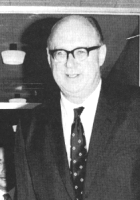 Sir John Cowperthwaite was the main figure responsible for Hong Kong’s economic transformation, lifting millions of people out of poverty. While scholars like Milton Friedman and F. A. Hayek put an intellectual case for the free markets, it was Cowperthwaite who provided the textbook example showing economically liberal policies leading to swift economic development. His practical example provided confidence to the Thatcher and Reagan governments, and was a key influence in China’s post-Mao economic liberalisation.
Sir John Cowperthwaite was the main figure responsible for Hong Kong’s economic transformation, lifting millions of people out of poverty. While scholars like Milton Friedman and F. A. Hayek put an intellectual case for the free markets, it was Cowperthwaite who provided the textbook example showing economically liberal policies leading to swift economic development. His practical example provided confidence to the Thatcher and Reagan governments, and was a key influence in China’s post-Mao economic liberalisation.
Cowperthwaite read classics at St Andrews and Christ’s College, Cambridge. While waiting to be called up by the Cameronians (Scottish Rifles), he went back to St Andrews to study economics. This Scottish education imbibed him with the ideas of the Enlightenment, especially the work of Adam Smith, who had been born nearby in Kirkcaldy. He was a liberal in the 19th century sense, believing that countries should open up to trade unilaterally. In 1941, he joined the Colonial Administrative Service in Hong Kong. When it fell to the Japanese, he was seconded to Sierra Leone as a district officer, before returning in 1946 to help the colony’s economic recovery. “Upon arrival,” the Far Eastern Economic Review put it, “he found it recovering quite nicely without him.” He quickly worked his way up the ranks and was made Financial Secretary in 1961, in charge of its economic policy for a decade.
When he became Financial Secretary, the average Hong Kong resident earned about a quarter of someone living in Britain. By the early 90s, average incomes were higher than Britain’s. Cowperthwaite made Hong Kong the most economically free economy in the world and pursued free trade, refusing to make its citizens buy expensive locally-produced goods if they could import cheaper products from elsewhere. Income tax was never more than a flat rate of fifteen percent. The colony’s lack of natural resources, apart from a harbour, and the fact that it was a food importer, made its success all the more interesting. Cowperthwaite’s policies soon soon attracted the attention of economists like Milton Friedman, whose television series Free to Choose featured Hong Kong’s economic progress in some detail.
Asked what is the key thing poor countries should do, Cowperthwaite once remarked: “They should abolish the Office of National Statistics”. In Hong Kong, he refused to collect all but the most superficial statistics, believing that statistics were dangerous: they would led the state to to fiddle about remedying perceived ills, simultaneously hindering the ability of the market economy to work. This caused consternation in Whitehall: a delegation of civil servants were sent to Hong Kong to find out why employment statistics were not being collected; Cowperthwaite literally sent them home on the next plane back.
Cowperthwaite’s frugality with taxpayers’ money extended to himself. He was offered funds from the Hong Kong Executive to do a much needed upgrade to his official residence, but refused pointing out that since others in Hong Kong did not receive that sort of benefit, he did not see why he should.
Cowperthwaite’s hands off approach, and rejection of the in vogue economic theory, meant he was in daily battle against Whitehall and Westminster. The British government insisted on higher income tax in Singapore; when they told Hong Kong to do the same, Cowperthwaite refused. He was an opponent of giving special benefits to business: when a group of businessmen asked him to provide funds for tunnel across Hong Kong harbour, he argued that if it made economic sense, the private sector would come in and pay for it. It was built privately. His economic instincts were revealed in his first speech as Financial Secretary: “In the long run, the aggregate of decisions of individual businessmen, exercising individual judgment in a free economy, even if often mistaken, is less likely to do harm than the centralised decisions of a government, and certainly the harm is likely to be counteracted faster.”
His ability to pursue policies which, at the time, were deeply unfashionable, was helped by having supportive Hong Kong Governors, Sir Robert Black and Sir David Trench, who both had free market sympathies. Moreover, Cowperthwaite was formidable at arguing his case: as Dennis Healey recalled: “I always retired hurt from my encounters with the redoubtable Financial Secretary.”
From 1972 to 1981, Cowperthwaite was an advisor to Jardine Flemming & Co in Hong Kong. He retired to St Andrews with his wife Sheila and was an active member of the Royal & Ancient. For many years, he spent six months of the year with his wife traveling the world visiting friends and relatives. He was an old school civil servant and, much to the frustration of economists, resisted requests to write an autobiography about his time in Hong Kong, believing that his duty was to serve, not to reveal the minutiae of government business.
– John James Cowperthwaite KBE OBE CMG, Financial Secretary of Hong Kong, born 25 April 1915; died 21 January 2006.
Search
Instagram: @andcusack
Click here for my Instagram photos.Most Recent Posts
- Burns Tower April 19, 2024
- Patrick in Parliament March 18, 2024
- Articles of Note: 13 March 2024 March 13, 2024
- Cambridge March 9, 2024
- Taken on Trust March 4, 2024
Most Recent Comments
Book Wishlist
Monthly Archives
Categories



